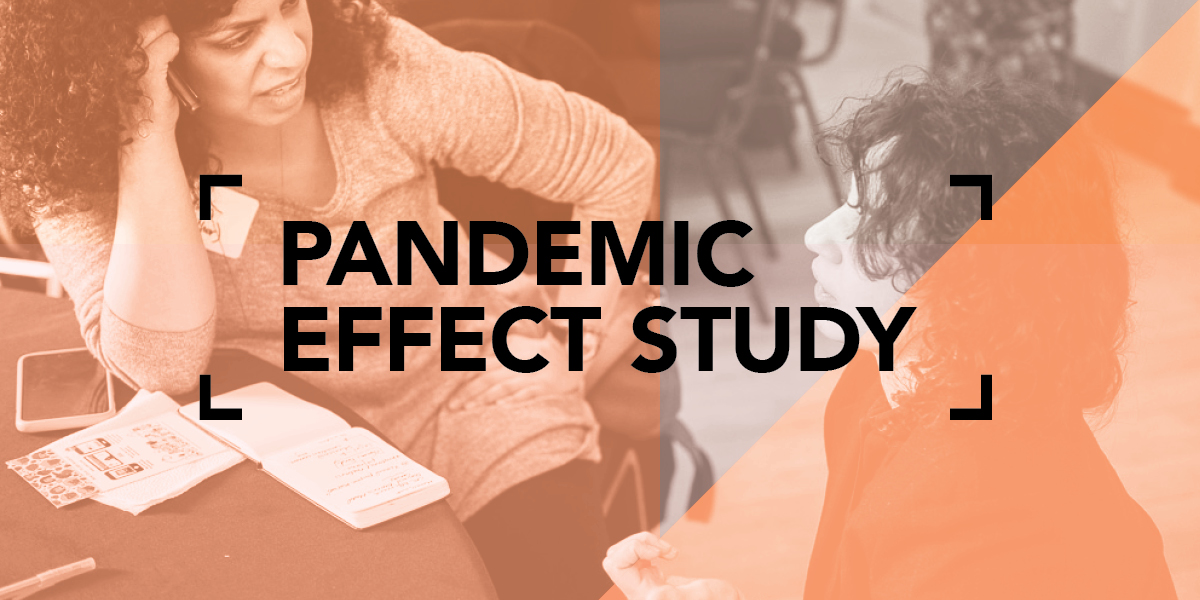
As part of its ongoing commitment to elevating and accelerating women-owned/led digital media companies*, the Canadian Film Centre’s Media Lab recently partnered with OCAD University and Nordicity to conduct a study of the impact of COVID-19 on these entrepreneurs. Entitled The Pandemic Effect: Exploring Covid-19’s Impact on Ontario’s Women/Womxn-led Digital Media Businesses, the study identified numerous coping strategies these women have employed, as well as valuable tools for moving forward from these extraordinary circumstances.
Building on the feminist business principles embedded in CFC Media Lab’s
Fifth Wave Initiative – radical collaboration, socially generative enterprise models, equity, liberation, and resilience – The Pandemic Effect directs us to focus on inclusivity, as well as gender, racial, and economic parity. It contains key ideas that respondents believe should inform future policy and shape regulation. Geared to an audience of women/womxn entrepreneurs, groups, support organizations, funders and collaborators, the report illuminates a clear picture of the gaps, challenges and opportunities faced by women entrepreneurs in the digital media landscape. It vividly highlights how these founders led the way by quickly adapting to the “new normal,” and their experiences contain important lessons for the women who will lead the companies of the future.
The report draws upon insights offered by the founders of 28 different women/womxn-led digital media companies, with the newest operating for fewer than five years, and the most established for fifteen. Most of them are micro and small businesses run by a handful of people; together they employed 200 full-time and 124 part-time, freelance or contract workers at the time of the survey. Two-thirds of these companies create digital media content, or provide services related to it; the final third delivers digital platforms and products. Researchers from Norcidity and OCAD University’s
Super Ordinary Team, along with the CFC Media Lab, endeavoured “to capture a snapshot of an unprecedented moment in time, and to identify and share crisis coping strategies from the perspective of these entrepreneurs as they navigate the disruption of COVID-19.” Employing a variety of participant engagement forums – including surveys, participatory workshops, and digital worksheets – to gather quantitative, semi-quantitative and qualitative data, the research was conducted over five months.
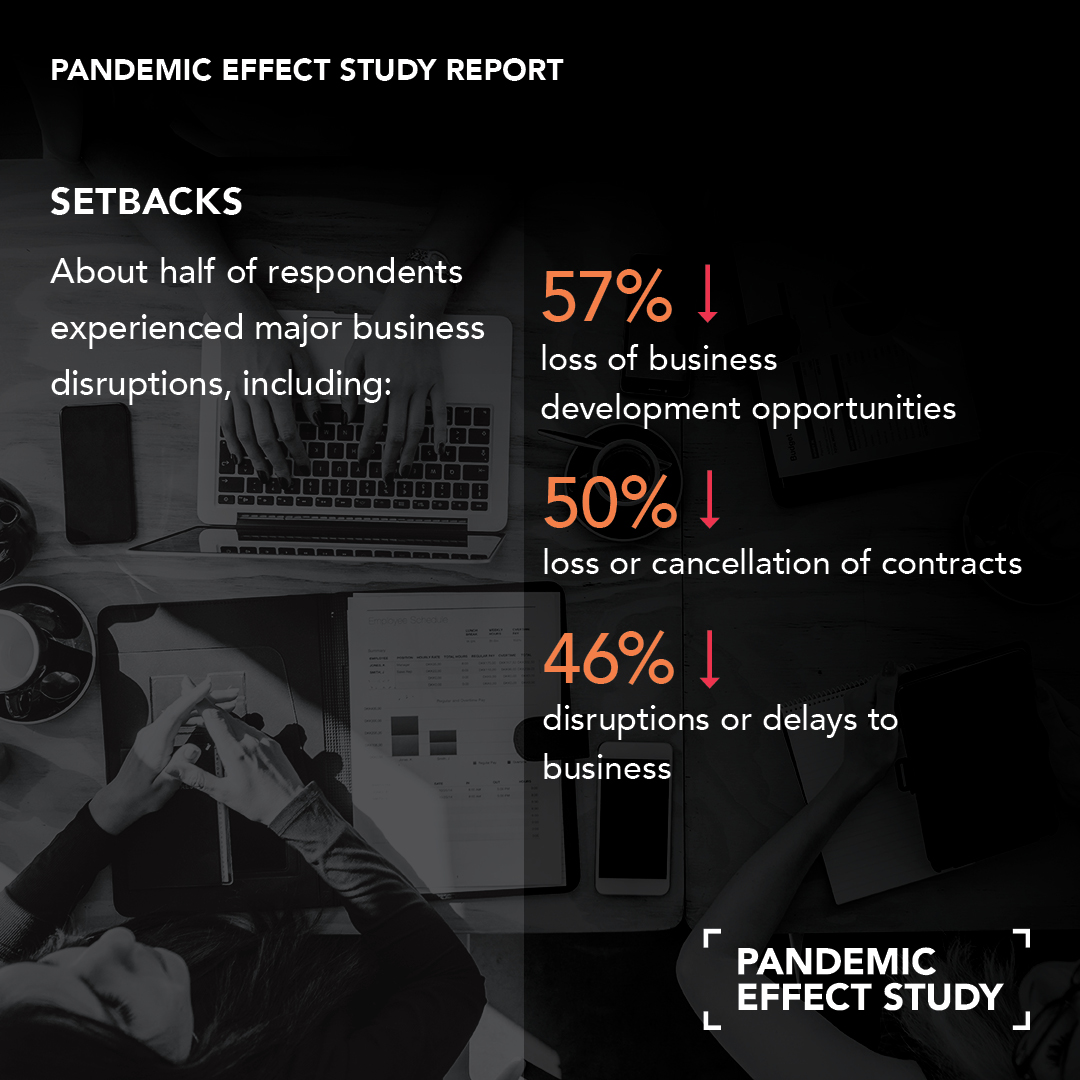
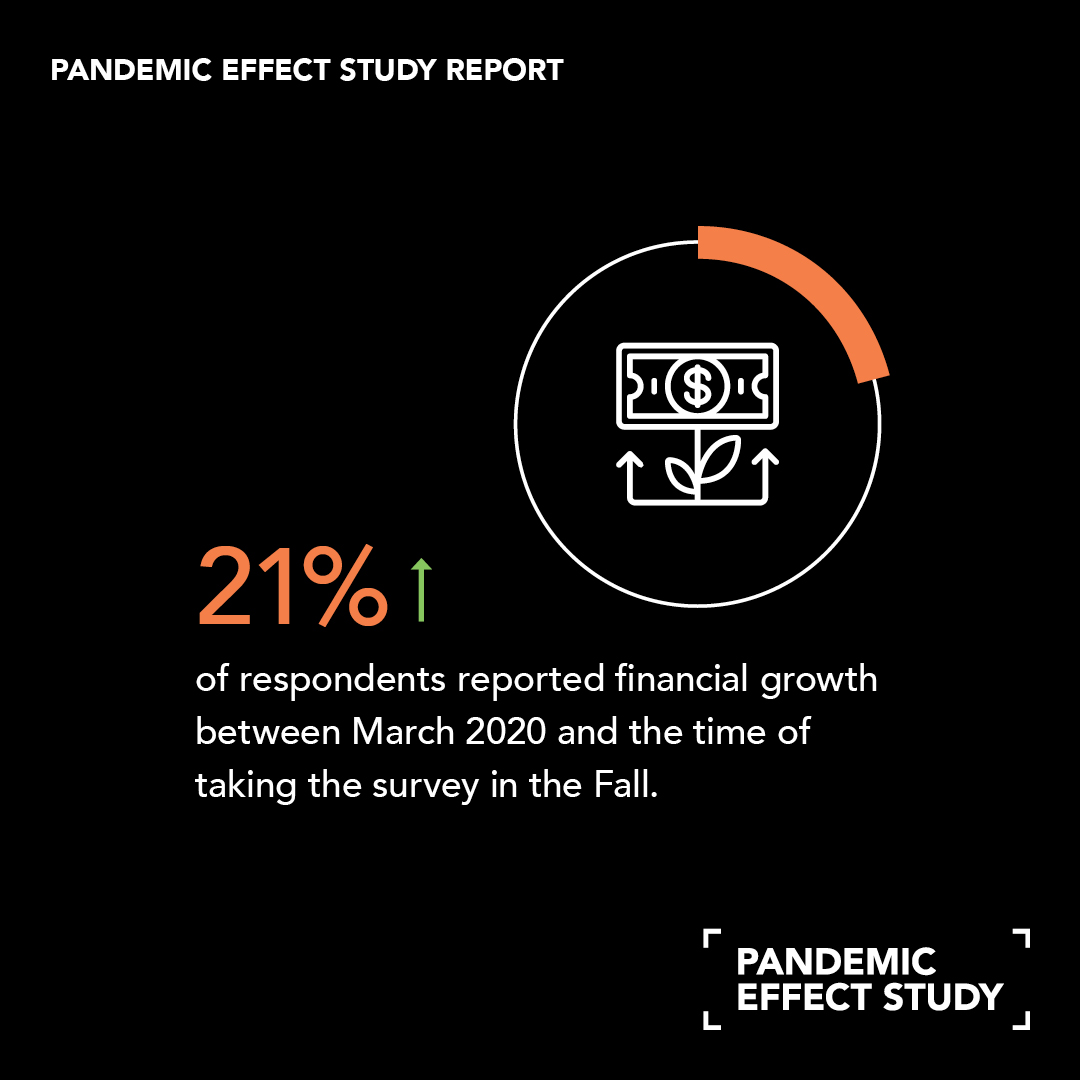
During four staggered phases of data collection, analysis and reflection, the collective observed as respondents underwent shifts in perspective. This approach gave researchers “the ability to chronicle the changing impacts of COVID over a short period of time.”
In Phase 1, the teams sought to explore several broad research questions, all positioned within the context of COVID-19, including:
- Have these entrepreneurs had to adjust their values and principles as they run their businesses? How have they deepened and retained those values?
- What internal and external challenges have women/womxn entrepreneurs been facing over this time?
- What strategies have been employed by women/womxn entrepreneurs to survive and thrive since March 2020?
- How can feminist business principles be used to mitigate the effects of COVID-19?
Between August and October 2020, a survey was implemented as Phase 2 of the study. The research teams asked the 28 digital media companies to rate a series of issues and assess each according to its impact on their abilities to run their businesses now and in the year 2023 should the pandemic be ongoing. The issues were rated by respondents on a scale from “Not Applicable,” “No Impact,” “Some Impact,” to “Large Impact.” Twenty-two
Social, Technological, Economic, Environmental, Political, and Values (STEEP-V) trends were singled out for rating by participants. So were six drivers, considered to be of high impact and concern both now and in the future: Funding Uncertainties; Awareness of Social Inequities; Supply Chain Disruption; Surging Unemployment; Physical Distancing; and Misinformation.
Reflecting on the year 2020, participants rated the most impactful trends and drivers as:
Increased Stress and Mental Health; Physical Distancing; and Loss of Work/Life Boundaries. They predicted that in 2023, the three most impactful would be Increased Stress and Mental Health; Anti-Racism Awareness; and Loss of Work/Life Boundaries. Both in 2020 and 2023, Unstable Cash Flow was perceived as fourth most problematic; Social Inequity ranked fifth as a factor in 2020 but may find its solution with an Increased Focus on Local, which replaces it in the number 5 slot for 2023. Other trends/drivers which were perceived as having disruptive potential both now and in the future include Social Inequity, Business Model Adjustments, Precarious Work, and Criticality of Internet Access.
Approximately half of the respondents reported feeling deeply concerned about cancelled contracts and a lack of new business. Though one in five of those surveyed reported being more productive in October than in March of 2020, 68% had also slowed or halted their ability to develop or deliver products. Other commonly cited setbacks included a loss of business development opportunities (57%), and disruptions or delays to business (46%). On average, companies anticipated a 20-month delay in the development and delivery of their products and services.
Financially, 50% of companies indicated they were “fine for now.” Encouragingly, 21% actually reported financial growth between March and October of 2020, but 18% were in “survival mode” by October, considering laying off staff. Eleven percent of companies described their finances as being in “dire straits.”
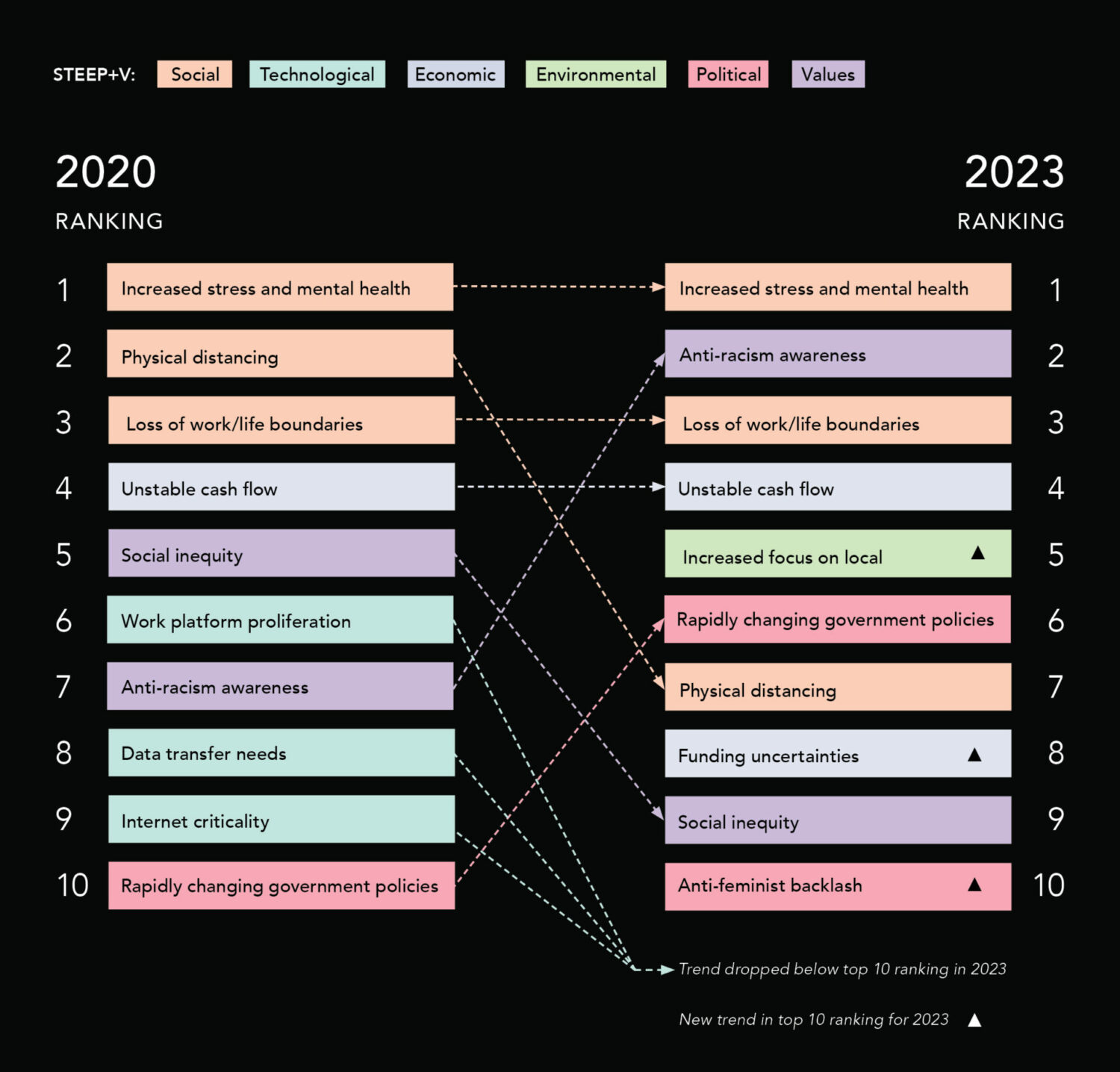
Trends and Drivers – Top 10 Ranking: Now and in Three Years
Following the survey, in October and November of 2020, the cohort took part in a series of Phase 3 workshops exploring the trends and drivers identified in Phase 2. In the first workshop, the group reviewed those factors and suggested new ones that had emerged since the survey and as the pandemic progressed. After discussion, the cohort formed two breakout groups to design business recovery strategies with these evolving concerns in mind: an unclear and unstable opportunity space; adapting HR to new needs and times; the Digital Gold Rush (a flooding of new entrants to the space); societal distress; increased unrest/crime; recession (economic contraction); extreme homelessness and poverty; and climate chaos.
Emerging from these discussions,
Focus on Local stood out for Group 1 as a clear way forward for femme-identified business owners. Strategies that were viewed as being highly impactful for companies willing to put in a concerted effort toward systemic change include: creating community; encouraging the creation of manufacturing in Canada; advocating a “neighbours helping neighbours” approach; and understanding dependencies on other countries. Equally impactful, but lower effort strategies were also recommended: starting to buy local; community Facebook pages; “barnraising”; identifying local organizations that put resources together; contacting local media; and partnering locally to combine resources and asks.
A
Business Model Adjustment will be required as the focus shifts from production to resilient and regenerative community contributions. Intrapreneurship, and the active integration of CSR principles will contribute to enhanced work/life balance for owners and employees alike. High-impact strategies they highlighted include: digital content and assets; people-centred economy practices; “Bake in” intrapreneurship; sustainability and knowledge economy; storytelling as a new approach to branding; intentional participation in society and (local) economy; and brining ethics to the forefront.
Addressing the challenge of
Unclear and Unstable Opportunity Spaces, it seems critical for success-focused enterprises to consider changing business behaviour in a number of ways. They recommend highly impactful strategies such as “polyamorous partnerships; understanding labour market shifts through futures thinking; getting rid of extraneous systems that may not be working in the current climate; creating a pool of collaborative research for many businesses to draw from and use in planning; and thinking about “access-based” pricing (social justice-based pricing) that might allow new markets to emerge.
Finding ways to
Adapt HR to Changing Needs and Times is equally important. Amongst activities considered most impactful were: developing remote company cultures where teams love to work; new employee manuals; talking to employees about how they want to work; creating spaces to cross-collaborate and gain a rapport; listing company values and making them clear; and trying different models of business teams to increase flexibility. Three key strategies that repeatedly surfaced in these breakout groups – in relation to all topics – were collaboration, new partnership models, and new business models.
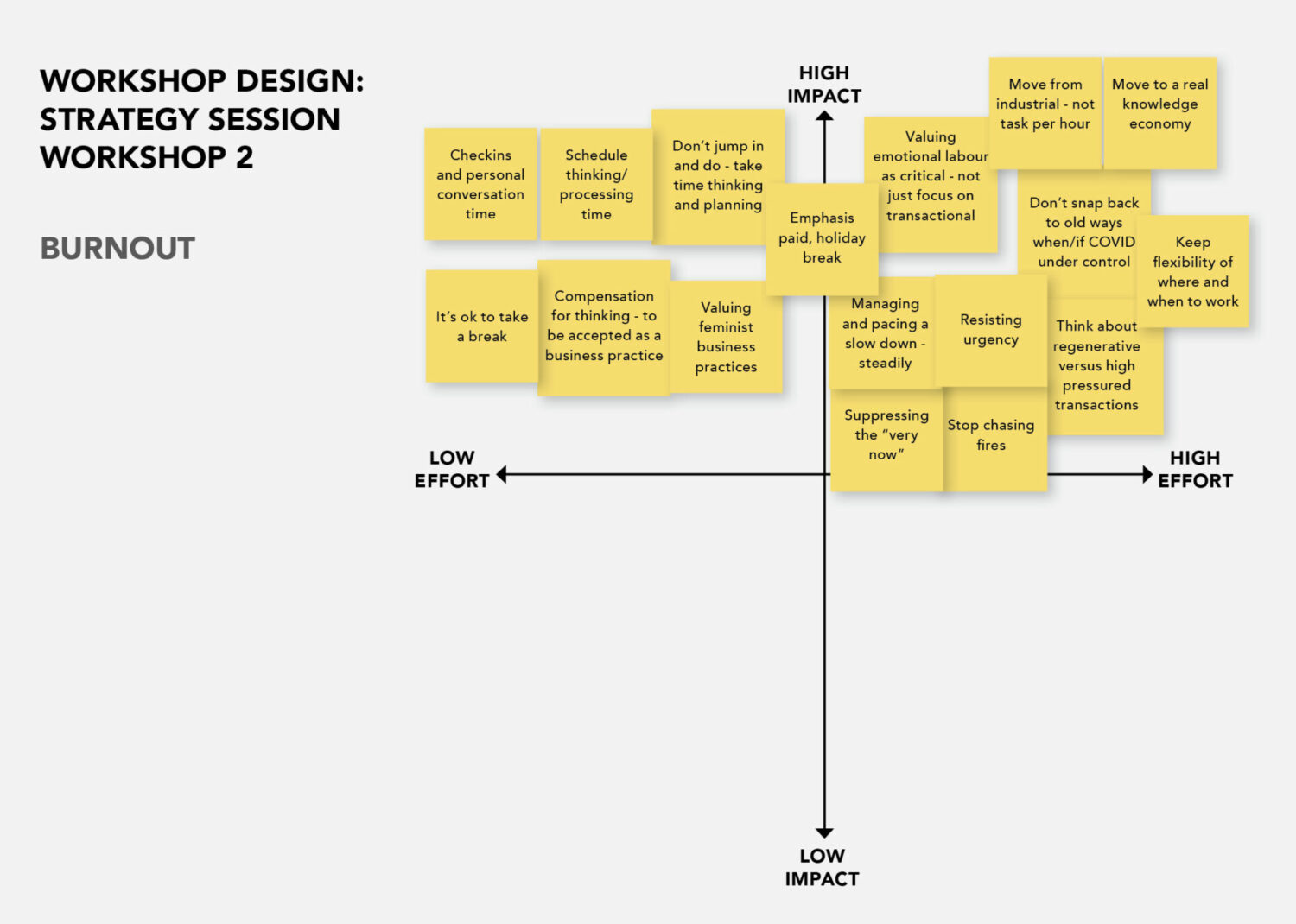
The second Phase 3 workshop in November 2020 “provided a notable explosion of new issues that reveal themselves as the COVID-19 timeline wore on,” according to
The Pandemic Effect. New trends identified by the participants were Burnout; Bar Too High for Small Businesses; Creating Forms of Alternative Income; Loss of Exercise and Staying Healthy through Activities; and a major Change in Engagement with Information (what are the rules and where is the accountability?). The cohort then explored solutions to the near-universal experience, and highest-rated trend – Burnout. The most important and effective approaches to this massive challenge were identified as: scheduling thinking and processing time; resisting urgency; keeping the flexibility of where and when to work; moving to a real knowledge economy; moving from task-per-hour industrial model; valuing emotional labour as critical (don’t just focus on transactional); emphasizing paid holiday breaks; checking in and personal conversations; compensation for thinking as an accepted business practice; knowing it’s okay to take a break; and valuing feminist business practices.
Finally, in Phase 4 of the study, researchers synthesized all of their data and worked to create this
first of its kind report. Packed with insights, information, infographics, charts, and other invaluable tools, it may prove an valuable navigational guide for women/womxn entrepreneurs in the changing landscape of our post-COVID world. As the report’s authors conclude, “The pandemic has proven to be the ultimate disruption – and we are exhausted by it. Support is needed; not a push towards disruption as an ideal, as it is inherently destructive.” The CFC Media Lab is proud to lay the groundwork for that support, and joins the call for lasting policy change that will ensure a more just future for women in business.
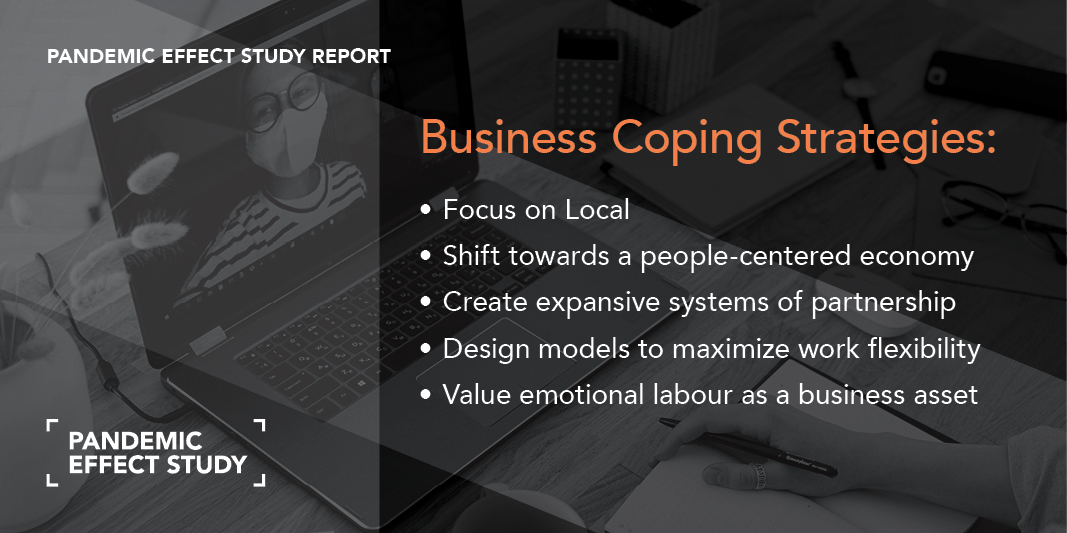
* For purposes of this study, Digital Media Companies are technology or technology-enabled companies that provide content, services, consulting, platforms and/or products in categories including arts, entertainment, information, education, recreation, culture, and immersive media.
Share this post: